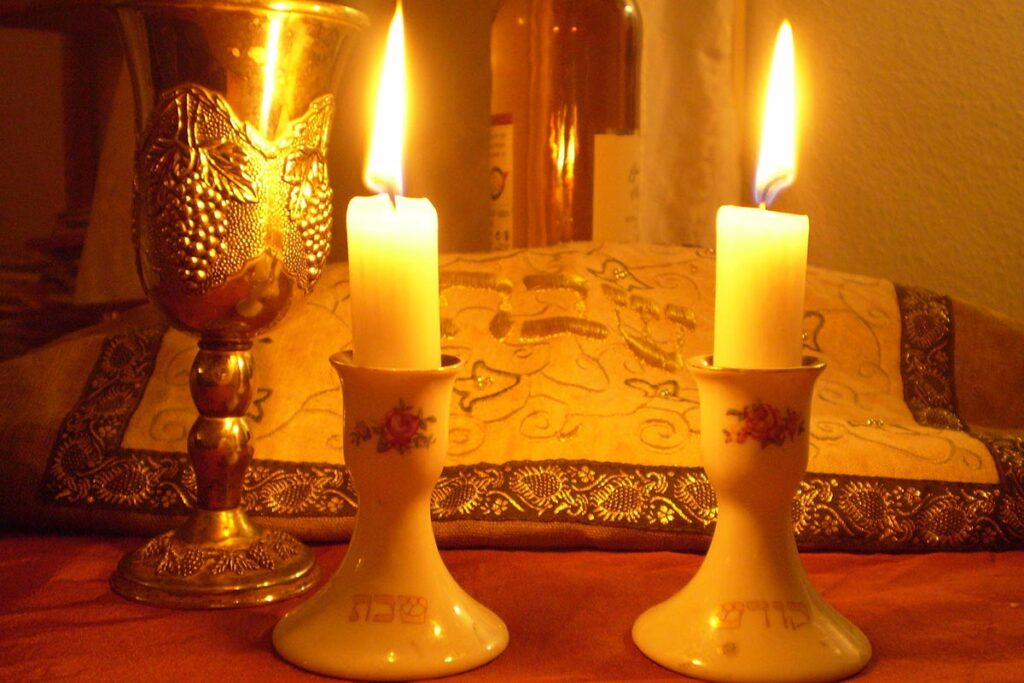
If you’re anything like me, you’ve had your ups and downs with your identity. Being a Jewish kid in the States can be a struggle.
Whether it’s preparing for your bar/bat mitzvah, telling people for the thousandth time that you are Jewish, or hearing antisemitism and stereotypical tropes on the daily, growing up here can be challenging.
While today I am a proud and passionate Jew, my journey to being comfortable with this has been a long and trying one.
Two years ago, I tended to hide my Jewish identity from others and often considered Judaism to be something forced onto me. Today, I am proud to express my Judaism and would do anything I can to stand up against antisemitism and educate people about Israel.
I would like to share my journey with you — specifically, how Judaism became a central part of my identity. If you’re struggling with being Jewish, I hope my story will inspire you to embrace your identity.

My earliest Jewish memories were in preschool. I attended synagogue with my family and celebrated many Jewish holidays with my school.
I remember the father-son Maccabee discussions, in which we learned how the Maccabees fought back against the Greeks, and the mother-son menorah-making classes. I always had an aptitude for Jewish learning and recall pretending that I was King David fighting Goliath on the playground.
This all changed when I had my first antisemitic encounter. While I didn’t realize it at the time, as I look back at the moment, I believe it affected the way that I viewed myself as a Jew.
On a family vacation in Buenos Aires, our tour guide, who was definitely of European descent, remarked in a snide voice that we were passing the city’s Jewish Quarter. Being the good-natured, free-willed kid that almost every 5-year-old is, I screamed out, “Jewish? We’re Jewish!”
Suddenly, I felt my mother’s hand pushed against my mouth in order to prevent me from saying anything else, as the tour guide turned around and glared. When we got back to our hotel, I asked my parents why they shushed me like that.
That was when they broke the hard truth to me that some people have a hatred for Jews. From that moment on, I promised myself to hide my Judaism so that nothing like our tour in Buenos Aires would ever happen to me again.
For the next few years, Judaism became a footnote to my life. Instead of centering everything I did around my Jewish identity, I tried to “wish my Judaism away” and never tell anyone who didn’t know me that I was Jewish.
I switched from a Jewish preschool to a predominantly Protestant all-boys school and did not engage in Judaism as much as I used to.
I remember singing “Jingle Bells” at the winter concert and questioning why there was no Hanukkah song in the repertoire. I also remember getting school off for holidays like Easter but not for Jewish ones. Even then, the double standard which Jews had to live with was evident to me.

After moving from New York to Miami in August of 2021, I heard several other antisemitic comments, including jokes about the Holocaust and mocking the language of Hebrew prayers. I took regular notice of antisemitic tropes and stereotypes thrown around casually in many of my day-to-day encounters, and sometimes I even felt pressure to join in.
Even though I attended synagogue on the High Holidays, fasted on Yom Kippur, and had experienced so much Judaism in my life, I didn’t feel comfortable with my Judaism and felt like an outsider.
I felt more ashamed of my Judaism than ever, even feeling out of place in Jewish environments. Despite coming from a semi-religious background and being exposed to a plethora of Jewish experiences, this internalized shame made me feel as if I didn’t belong anywhere. Even the ceremonies and traditions of my childhood felt foreign to me, as if I had no connection with them at all.
This all changed last summer.
In my family, after a bar/bat mitzvah, our parents take us on a trip to Israel to connect with the homeland and further bond with our parents. Because I was a COVID-mitzvah, they were not able to take me on one of these trips immediately afterward.
However, last June, my parents surprised me and told me that we were going to Israel in a few weeks. When I arrived, I was miserable. Jetlagged and sluggish, I got into a car bound for somewhere in the West Bank.

When the car rolled to a stop, I begrudgingly got out and realized where I was. I was at Shiloh, the supposed site of the Tabernacle (the main spiritual center for the Jews living in Israel before the Temple was built in Jerusalem).
I did some excavation and discovered the hip bone of an ancient sacrificial animal. After this, I took another short car ride to the mountains overlooking Nablus. The Israelis we were with opened up their siddurim (prayer books) and told me to begin reading.
As I became entranced with the verse which was handpicked for me, my life as a Jew flashed before my eyes, and a miracle occurred. Setting the book down with a grin on my face, I confidently exclaimed, “I am proud to be Jewish.”
This was just the beginning. As I traveled around Israel, I learned of hundreds of stories in which Jews gave up everything for a home. I heard about Holocaust survivors, Yemenites, Mizrahi and Ethiopian Israelis who fought for a home, antisemitism in modern times, and how Jews were persecuted in the ancient world.
Above all, perhaps paradoxically, I finally felt accepted. Israel became my home away from home. I know that returning there is always an option. As long as there is a state of Israel, there will always be a place, not only for me, but for every single Jew on earth.
After the trip ended, I had what I like to call “Israel Fever.” I related everything to Israel and defended the Jewish state over anything. After our surprise trip, my family had planned to travel to Europe for a few weeks, and when we arrived in Vienna, the city in which my ancestors resided for hundreds of years, I viewed it in a different light.
Proudly wearing my Magen David and Israeli Defense Forces hat, I received more than a few snide looks and remarks. In fact, while at the Vienna Opera House, I was called a “rude little Jewish boy” by an elderly Viennese woman. When the trip ended, I was happy to be back in the USA.
Since then, I have had a handful of antisemitic encounters, including the time someone graffitied a swastika on the elevator of the host-house I was staying in on a trip to Spain and the time an acquaintance of mine sent me a picture of himself dressed and posing as Hitler.
After my transformative trip to Israel, however, I view these moments differently. I understand they come from ignorance and hate, and I don’t hide or feel a need to join in like I used to.
Now, I stand up. I protect my identity, and I educate offenders on why they are wrong. There should be zero tolerance for antisemitic bigots, and my story is proof of that, a story of an easygoing Jewish kid who hid his Jewishness for years because of the hatred of others.
Originally Published Mar 6, 2023 05:10PM EST


